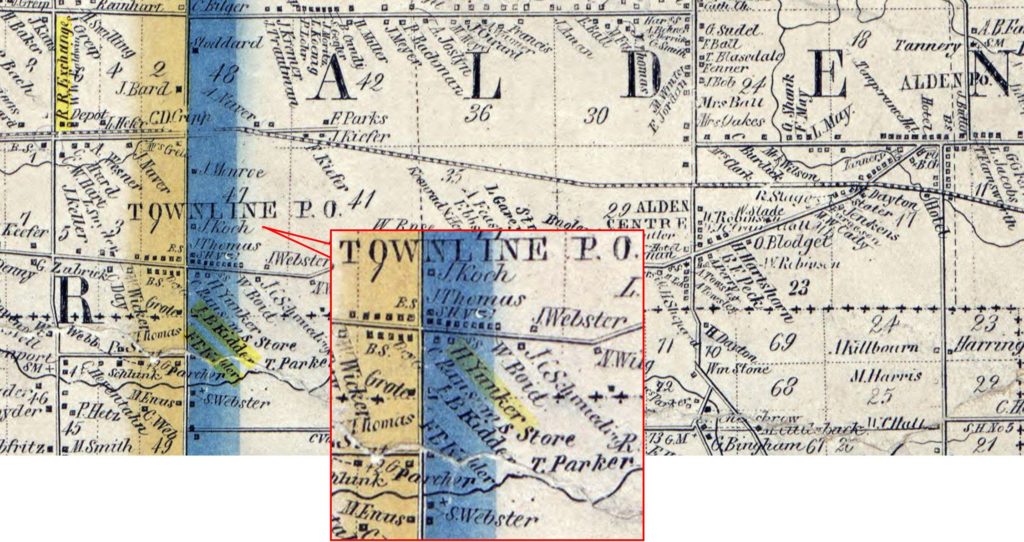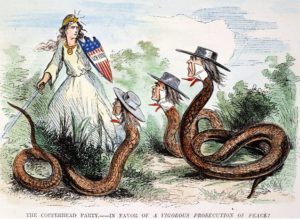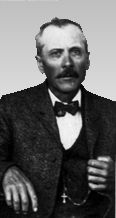In a previous essay I explored whether my great great-grandfather, Jacob P. Yuncker (1837-1905), served in the Civil War. Apparently he was drafted in August 1863, but I could find no record of him actually serving. I concluded he was probably granted an exemption to care for his sick wife Rosa. Or perhaps he had already left the area either coincidentally or to avoid the controversial draft. I have since discovered more of his story.
An 1855 plat map of Erie County, New York shows the house where Jacob’s parents lived, and no doubt where Jacob and his siblings grew up.1 It is a nondescript community half way between Lancaster and Alden, just east of Buffalo, New York. The map indicates it is “Town Line” post office and it does straddle the boundary of both Lancaster and Alden townships.
Town Line was a community of German immigrants started about 1844. Jacob’s parents Hubert and Barbe Yuncker immigrated to America in June 1847 from the predominately German region of Alsace, France. Records indicate they settled near Alden, New York. The map proves it was in Alden Township, not Alden proper, and specifically in the community of Town Line. See “H Yunker,” inset, highlighted.

It turns out Town Line is infamous for being the only northern city to secede from the Union. By a two-to-one vote, in a school house across the street from the Yunckers in 1861 the residents voted to secede. A newspaper account2 reads:
“Treason in our Midst.”–We have received a circular calling a meeting of the inhabitants of the city of Town Line, on the 4th of March next, to which we seriously invite the attention of our District U. S. Judge, U. S. Marshal, Collector, Post Master and all others in authority. The circular in question sets forth that at a meeting of the Common Council of Town Line, a resolution was introduced by Mayor Neel, urging absolute secession and the formation of an independent government by the Town Line on the 4th of March. A ticket for President and Vice President, is also put in nomination, and names suggested for the Cabinet, and Foreign Ministers of the same.
In order that there may be no mistake as to the enormous treason contemplated we publish the entire resolution naming the boundaries of the seceded territory:
“Resolved, That in accordance with the usages heretofore established by other nations, it becomes necessary for us to establish a seat of government and define its limits, and as our city charter defines the following, we deem it sufficient for a Capitol of our Confederacy:–Commencing at the “Town Line Corner House, and running east on Main street to a Cider Mill, where a stake defines the eastern boundary; thence north from the Town Line Corner House to Rowley’s Avenue; thence westerly along Rowley’s Avenue to the Exchange; thence south on a line 36 30 crossing Main street to a stake at the corner of First street; thence easterly along First street to Wood Pecker Avenue; thence south on Wood Pecker Avenue to the rendezvous of our President, (Col. Leroy L. Tiffany); thence at a sharp turn at right angles to a stake at the corner of lot owned by our Vice President, (Hon. Bradford P. Kidder); thence north on Wood Pecker Avenue to the Town Line Corner House, owned and commanded in person by Major Wilhelm.” And resolved also, that we unanimously concur in adopting the foregoing as the boundaries of our future Republic.”
The circular has the names of the Mayor and Common Council of the city of Town Line, and is in every particular an authentic document—the copy of which was found in the pocket of an estray Town Liner who had evidently taken too much lager on Saturday night, and had sought lodgings in the City Hotel, at the corner of Mohawk and Pearl streets. A telegram has been sent to President Buchanan.
The exact boundary is unclear because the map above does not show street names. However I highlighted the railroad Exchange and two properties marked Kidder. It seems it was the existing boundaries of the village.
Another newspaper3 account doesn’t take it seriously:
Politics at Town Line.–Town Line, a place about twenty miles out on the railroad, and comprising one dwelling house and two woodsheds, has perpetrated a very large goak, considering its (Town Line’s) size. We have received a paper, in which is published to the world, Town Line’s ordinance of secession. Not only has Town Line “seseshed,” and “disuned,” she has organized a home government and appointed ministers to foreign countries, Joseph Meyer, of Buffalo, being named as Minister to China. It may be necessary to add that “this is a goak.”
Town Line was larger than just a house and two woodsheds, and goak is a play on joke, as in practical joke. Although the meeting was planned for March 4, 1861, the actual vote was apparently conducted later that year. Or was it?
The town did not vote to rejoin the United States until 85 years later in 1946. But that was only after a reporter brought to light perhaps the very same newspaper articles quoted above. An elaborate ceremony was held and even President Truman knew of the occasion. However there is no evidence of the original meeting. No meeting minutes exist, and no document or resolution can verify they actually seceded. It appears to be nothing more than political satire. It is especially absurd, considering a Minister to China and other ambassadors were nominated.
If they did vote, the secession had no practical or legal effect, nor was it recognized by the Confederacy. There is virtually no coverage of it in newspapers of the day. As for the draft, some men from Town Line did serve in the Union Army. There are conflicting reports whether any went south to join the Confederate Army.
“Copperheads” as they were called, were Democrats who lived in a northern state and who opposed the Civil War and the draft. It is unknown whether Jacob Yuncker voted to secede in 1861. Later in life he was very active in community organization and politics. He ran as a Democrat and served several times as township supervisor, in two different Michigan townships. He also served as highway commissioner and school director. Although, he once described himself as an independent.
The Germans at Town Line were likely not Copperheads in the true sense, but there was likely vigorous debate on both sides of the issue. After all, a major reason they left Germany was to avoid mandatory conscription in the Prussian Army. They may have been against the war for moral and religious reasons, rather than supporting any ideology of the Confederate states.
Jacob continued to work in Alden Township and perhaps Town Line itself, at least from September 1862 to June 1863. He was probably with his wife when she died there in May 1864. I could find no record of him in Confederate Army rosters. Even though he was drafted, the secessionists in Town Line must have had some influence, and he apparently never joined the army.
Jacob’s younger brother George Yuncker did serve in the Civil War. He volunteered first with the Twenty-first New York Infantry, from March 1862 to May 1863. He later re-enlisted in the Fourth Heavy Artillery, from January 1864 to September 1865. So were the Yunckers a family split between Unionists and Secessionists? The mystery still remains, but with more clarity. The Yuncker family was at the center of a historic rift during a tumultuous time.
Conclusion
Although the “secession” of Town Line was no doubt rooted in the contentious issues debated throughout the country, it was probably only political satire. It was resurrected as a publicity stunt decades afterward and ascribed the modern-day meaning of a Confederate holdout. In fact the period accounts only mention Town Line’s desire for independence from any government, and from the turmoil on either side of the Civil War.
Footnotes- Geil, Samuel, Robert Pearsall Smith, and Matthews & Co Gillette. “Map of Erie County, New York: from actual surveys.” Philadelphia: Gilette Matthews & Co, Publishers, 1855. Map. Retrieved from the Library of Congress (https://www.loc.gov/item/2012593658/ : downloaded May 21, 2017).
- The Buffalo Commercial, Buffalo, New York, Thursday August 22, 1861, page 3.
- Buffalo Courier, Buffalo, New York, Tuesday, February 12, 1861, page 3.



UPDATED: I concede the “secession” of Town Line, NY was most likely a political satire in 1861, and a publicity stunt when it “rejoined” the Union in 1946. Although, the issues our ancestors confronted were still very much real.
Thanks for your story. I have been researching Town Line history between 1853-1864. I am writing a biography on my 2nd great grandfather Julius Krummel. He was the first minister of Town Line Lutheran Church during that time. Your gg grandfather I’m sure knew of him, and may have attended the church.
I’m interested in learning what you discover. Yes, both men probably knew each other, but my ancestors were Catholic and they would not have attended the Lutheran Church. I wonder what part religion played in the community.